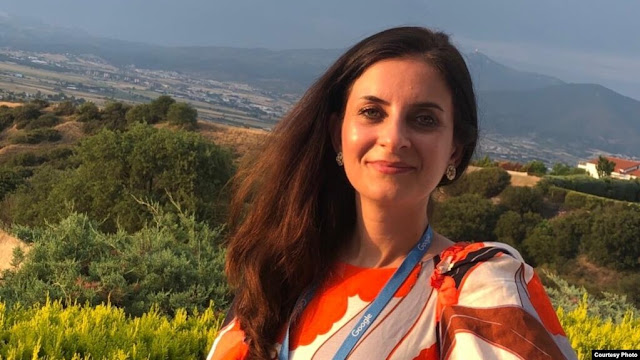About a year ago, she decided to learn how to read and write in her mother tongue after joining Turkish-language chat rooms on the Clubhouse app.
Turkish Chat Rooms on Clubhouse
“During the pandemic, while we were staying home, I joined Clubhouse. I discovered that there were rooms in our language, with Turkish friends speaking. I joined them because here (in the U.S.), I mostly spoke Turkish only with my family. Suddenly, I found myself surrounded by many Turkish-speaking friends on Clubhouse. What was wonderful was that people from all over the world participated. There were people from various cities in Iran where Turks live. I had never before had the opportunity to connect with so many Turkish friends from other cities. Some of them were activists,” Nahid Jafari explains.
She noticed that some users in these chat rooms spoke Turkish in a different style:
We told them, ‘The Turkish you’re speaking doesn’t sound like ours.’
“There was something interesting in these rooms. Some friends spoke Turkish in a way that, regrettably, I even said once or twice, ‘The Turkish you’re speaking doesn’t sound like ours. We don’t understand it. Why are you speaking in Baku Turkish? Why are you speaking in Turkish from Turkey?’ These debates happened often. Sometimes they would say to us, ‘Well, you’re not speaking Turkish at all—you’re speaking Persian.’ That made me think. Unfortunately, I realized I couldn’t even speak my native language properly. Writing and literacy had been denied to us, and now it seemed my speaking wasn’t correct either.”
Jafari adds, “This made me think that I could learn my language and correct my mistakes. The friends on Clubhouse inspired me to care more about my mother tongue and learn it properly. Later, I found out from those friends that a teacher from the University of Toronto, Lale Javanshir, was teaching Turkish online. My friends recommended me, and that’s how I started learning Turkish.”
Struggles with Learning Persian During Early School Years in Tabriz
Professor Jafari reflects on the difficulties she faced learning Persian during her elementary school years:
“I’ve always had this fear that I struggle with learning languages. During my school years, learning Persian was a painful experience. This created a lifelong fear of languages for me. When I graduated from university and wanted to leave Iran, I started learning English, but I always carried this fear that I wasn’t good at learning languages.”
Recently, Jafari participated in a social media campaign titled Me and Persian and shared her experiences from her early school years. She elaborated on these experiences to Voice of America:
“When I started school, I didn’t know a word of Persian. No one in my family spoke Persian, and we didn’t even have a television to watch Persian films or cartoons. At school, I would stay completely silent, like a mute child, just sitting quietly. I excelled only in math because math has its own language. True, our teachers were Turkish and would speak Turkish in class, but they taught in Persian.
In fourth grade, we had to write essays. In Social Studies, we had to answer questions—in Persian. Unfortunately, my fourth-grade teacher wasn’t a kind person, so I couldn’t keep up. I failed both essay writing and Social Studies and couldn’t pass the grade.”
Online Turkish Courses and Book Reading Club
Years later, when Jafari began learning to read and write in her mother tongue, she found herself recalling those fears associated with learning languages.
“I had never seriously thought it was necessary for me to learn Turkish, my mother tongue. But I always wondered why, during our childhood, we weren’t taught our native language in school,” she says.
After enrolling in an online course to learn Turkish, Jafari realized how difficult it was for her to read Turkish texts. This inspired the idea of creating a book reading club.
“I joined the Turkish course, but my level was very low. I realized I wasn’t learning much. Lale, my teacher, gave me texts to read. I would try to read them letter by letter, word by word. Then I thought to myself, ‘This course is ending, and I haven’t learned anything.’ I became somewhat familiar with the alphabet and a bit of grammar, but that was it. So, during class, I told my teacher that I wanted to start a book reading club. We had a group on Clubhouse called Agenda Talks where we would discuss general topics. I turned it into a book reading club.”
We Now Read 300-400 Page Novels in Turkish
Over the past eight months, Nahid Jafari and the other members of the Agenda Talks club have met three times a week to read novels such as Ali and Nino and Foggy Tabriz as well as other stories. They are currently reading Ismail Shikhli’s Deli Kur (The Mad Kura River).
“This club has been very beneficial for me. I’m learning Turkish, my mother tongue. I’m reading books, novels. My friends tell me my speaking has improved a bit—not enough yet, but it’s gotten better. However, my reading has improved significantly; I can see that myself. Now, my friends and I are reading 300-400 page novels. But we haven’t stopped at just reading. Together, we’ve started writing. I’ve written book reviews. I used to write memoirs in Persian; now I’m writing them in Turkish,” Jafari adds.
Link to the original interview in Turkish on the Azerbaijani section of Voice of America:
Nahid Cəfəri: Təbrizdə məktəb illərində yaşadığım acı təcrübələr məndə dil öyrənməklə bağlı fobiya yaratmışdı

